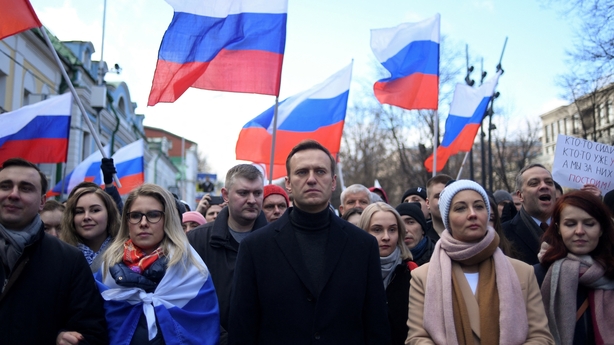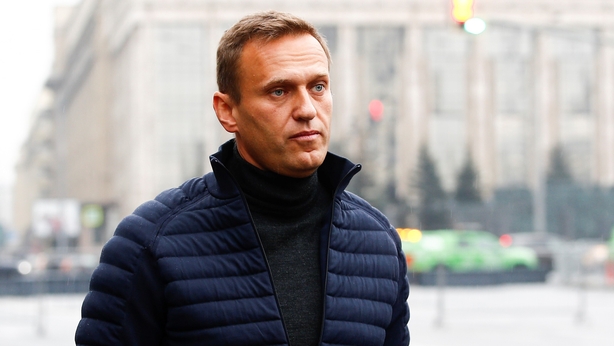Russian Ambassador to Ireland Yuri Filatov has said he does not accept the premise that Russian opposition leader Alexei Navalny was killed, calling the accusation "absolutely unacceptable".
Speaking on RTÉ's Drivetime, he said: "It would seem to me that at least we should wait until the facts are on the table to make any conclusions.
"This whole exercise in rhetoric, it looks to me very, very fishy and undignified concerning the circumstances."
Mr Filatov described the allegations as "nonsensical".
Yesterday, the Department of Foreign Affairs summoned Mr Filatov to "express outrage" at Mr Navalny's death.
The department said it was reiterated to Mr Filatov that "ultimate responsibility" for Mr Navalny's death "rests with Russian leadership", while the department also called for a full, independent and transparent investigation.
Mr Filatov told Drivetime that he had a "frank and candid conversation" at the Department of Foreign Affairs.
"I'm not taking any offences personally, being in our business sometimes means having some frank and candid conversation we have had one of these yesterday."

Mr Filatov insisted the examination of Mr Navalny’s body was impartial.
"I don’t have the slightest doubt in my mind that the procedures and investigation which is carried out right now is impartial according to the law and all the circumstances surrounding the method.
"The speculation until the facts are out is absolutely out of place. I mean it's just simply undignified," he added.
In relation to claims that Russia is hiding the opposition leaders' body, Mr Filatov said: "There is nothing here in terms of a cover-up or to hide something.
"There is simply attention to facts, to establish facts to explore all circumstances connected to the demise of the person."
He described EU and US sanctions against Russia as "failed policy", adding the penalties "will not bring the results".
'No question' Russian state killed Navalny
Earlier, Tánaiste and Minister for Foreign Affairs Micheál Martin said he believes that Mr Navalny was killed by the Russian state.
Speaking on RTÉ's Morning Ireland, Mr Martin said he agreed with Mr Navalny's widow, Yulia Navalnaya, who told a meeting of EU foreign ministers yesterday that the Russian state killed her husband.
"I do, there is no question about that," he said.
The Tánaiste said that during the meeting it was made "very clear" that Ireland condemned the death of Mr Navalny.
"We feel it reflects a very repressive regime that shuts down any form of internal dissent," Mr Martin said, adding that there was no question that Russian leadership was involved in Mr Navalny’s death.
We need your consent to load this rte-player contentWe use rte-player to manage extra content that can set cookies on your device and collect data about your activity. Please review their details and accept them to load the content.Manage Preferences
"And I'm not just referring to the actual immediate situation at the weekend but rather the progressive, savage treatment of him in terms of the imprisonment, his movement to the Artic circle.
"I think there were some harrowing accounts of the later stages of his detention, in terms of the freezing cold in the cells, the limited exercise and a lot of that has been well articulated."
"It reminds us all of the type of regime operating in Russia"
He added that it was "quite chilling" and "ruthless" that anybody could be treated in this manner.
Mr Martin said it was made clear to Mr Filatov that harsh sanctions on Russia will continue in the wake of Mr Navalny's death.
He said they have already subjected Russia and the Russian leadership to the "most expansive and hard-hitting sanctions in European history".
Today, Ireland's Ambassador in Moscow laid flowers commemorating the death of Alexei Navalny.
Ireland reiterates its call for a full, independent and transparent investigation into his death and the release of all political prisoners held in Russia. pic.twitter.com/IvrIDgV6Qi
— Irish Foreign Ministry (@dfatirl) February 21, 2024
"It reminds us all of the type of regime operating in Russia," Mr Martin said, adding that "we wanted to formally communicate that view" to Mr Filatov.
Read more:
Watch: In court a day before his death, Navalny laughed, cracked jokes
Who was Alexei Navalny, Russia's most prominent opposition leader?
Russia to keep Navalny's body for 'at least two weeks', his team says
The Russian opposition leader's death was announced last Friday, when prison officials said he collapsed and lost consciousness at the penal colony north of the Arctic Circle where he was serving a long jail term.
Mr Navalny, 47, was by far Russia's most famous opposition leader.
He rose to prominence more than a decade ago by lampooning the elite class around President Vladimir Putin and voicing allegations of corruption on a vast scale.

EU foreign policy chief Josep Borrell has pledged that Mr Putin will be held to account for Mr Navalny's death after he met the opposition leader and Kremlin foe's widow.
Mr Putin has made no public comment but Russian officials have scolded Western leaders for rushing to conclusions about the death, which has further deepened a schism in relations between Moscow and the West caused by the Ukraine war.

